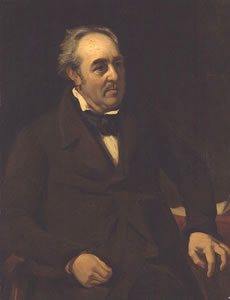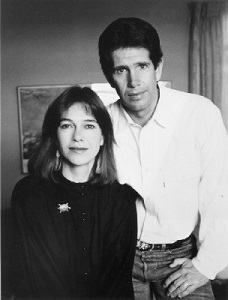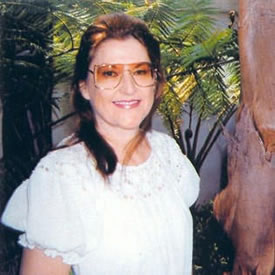De Amerikaanse dichter en schrijver Richard Brautigan werd geboren op 30 januari 1935 in Tacoma, Washinton. Zie ook mijn blog van 30 januari 2007 en ook mijn blog van 30 januari 2009.
My Nose Is Growing Old
Yup.
A long lazy September look
in the mirror
say it’s true.
I’m 31
and my nose is growing
old.
It starts about 1/2
an inch
below the bridge
and strolls geriatrically
down
for another inch or so:
stopping.
Fortunately, the rest
of the nose is comparatively
young.
I wonder if girls
will want me with an
old nose.
I can hear them now
the heartless bitches!
“He’s cute
but his nose
is old.”
30 Cents, Two Transfers, Love
Thinking hard about you
I got on the bus
and paid 30 cents car fare
and asked the driver for two transfers
before discovering
that I was
alone.
Richard Brautigan (30 januari 1935 – september 1984)
Hier (l) met de dichter Lawrence Ferlingetti (r)
De Duitse dichter en schrijver Hans Erich Nossack werd op 30 januari 1901 geboren in Hamburg. Zie ook mijn blog van 30 januari 2007 en ook ook mijn blog van 30 januari 2009.
Ist das der Mensch?
Ich weiß, daß man mich eines Tages braucht.
Soll ich dann sagen, wenn sie suchend kommen -:
“Was war es noch, was uns die Flut genommen?”
Auch ich bin in Vergessenheit getaucht?
Schlimm ist die Welt versandet und verschlammt.
Seht auf den Straßen die Gesichter doch;
die alten süßen Formen sind es noch,
nur alles ausgelöscht, was sie entflammt.
Man geht umher wie auf dem Meeresgrunde
von Flut betäubt, bleibt stehen um zu lauschen:
Ist das das Leben? Wirklich? Ach, wir Armen!
Und dämmert weiter. Niemand weiß die Kunde.
Was war es noch? Man hört die Not nur rauschen.
Ist das der Mensch? Haben wir doch Erbarmen.
Der Abfall
Sie saßen bei Tisch. Da ging ich heimlich fort.
Nur meinen Namen ließ ich ihnen dort.
Der saß auf meinem gewohnten Platz und sollte
antworten; jedem, was er hören wollte.
Denn das genügte wohl, und es wäre
nie aufgekommen, wenn er nicht vergaß
zu lachen. Als sie wieder lachten, fraß
ihr Lachen dort sich, wo er nicht mehr saß,
ins Leere.
Was sie mit meinem Namen machten,
als sie es merkten, und was sonst geschah?
Sie saßen bei Tisch und sitzen jetzt noch da.
Vielleicht daß sie nur etwas lauter lachten.
Wie ich sie kenne, dachte keiner durch die Lücke
seiner Unsterblichkeit hinter mir her
ins Namenlose. – Weitab ihrem Glücke
steh ich und
höre sie nicht mehr

Hans Erich Nossack (30 januari 1901 – 2 november 1977)
De Estlandse schrijver Anton Hansen Tammsaare werd geboren op 30 januari 1878 in Albu. Zie ook mijn blog van 30 januari 2007 en ook ook mijn blog van 30 januari 2009.
Uit: Truth and Justice (Vertaald door Alan Trei and Inna Feldbach)
“Don’t give me anything, master,” said Jaagup, “or else you might start thinking about lowering my pay because you get the idea that I can’t work well on an empty stomach.”
But Jaagup worked himself to exhaustion, and on that score Andres had nothing to grumble about. And on Saturday night and Sunday he was just as indefatigable, going to village dances and parties. It was easy to see why, since he was the best concertina player in the area and so was always invited and welcomed. Nights he rambled about in the villages and knew where all the maids and farmer’s daughters were sleeping, and with whom. But he himself had no time for those secret games and whispers. Not because no one wanted him — even farmer’s daughters wouldn’t have refused him — but because Jaagup was a dreamer who yearned for something unexplained and distant.
Often he stopped for a moment, by the gate or in the middle of the high field, and gazed at the lonely farms scattered about in the bogs, the sails of windmills showing here and there, the faraway bright white buildings of the manor, the marshes, bogs and copses which in the distance blended together and became the blue rim of the sky.
But each time, his eyes halted on two high wooded areas sheltering some gray buildings. At this distance, it was impossible to say what they were.
In fact there was a village there, with a farm called Põlluotsa where there was a daughter named Roosi. Jaagup thought she was the most beautiful girl he had ever seen. Two years ago he had worked on the farm and since then hadn’t been able to forget Roosi. It was because of her he had bought the concertina and learned to play it. He wanted to be something special in her eyes.
When people were dancing they felt that Jaagup was playing for them. But he wasn’t. Jaagup thought only of Roosi and was playing for her. Even at Robber’s Rise, on the garden steps, by the gate, along the field edges, or sitting on a stone, his mind was filled with Roosi.
For a while Leena thought he was playing for her. But finally one day she learned the truth, because Jaagup himself told her, when his heart was so filled with love that he couldn’t contain it any more. Mari, the mistress, learned about Jaagup’s great happiness in the same way. The boy would have told Andres about it too, if he had shown any interest in such things.”
Anton Hansen Tammsaare (30 januari 1878 – 1 maart 1940)
Standbeeld in Tallin
De Engelse dichter en schrijver Walter Savage Landor werd geboren op 30 januari 1775 in Ipsley Court, Warwickshire. Zie ook mijn blog van 30 januari 2007
In spring and summer winds may blow
In spring and summer winds may blow,
And rains fall after, hard and fast;
The tender leaves, if beaten low,
Shine but the more for shower and blast
But when their fated hour arrives,
When reapers long have left the field,
When maidens rifle turn’d-up hives,
And their last juice fresh apples yield,
A leaf perhaps may still remain
Upon some solitary tree,
Spite of the wind and of the rain . . .
A thing you heed not if you see.
At last it falls. Who cares? Not one:
And yet no power on earth can ever
Replace the fallen leaf upon
Its spray, so easy to dissever.
If such be love, I dare not say.
Friendship is such, too well I know:
I have enjoyed my summer day;
‘Tis past; my leaf now lies below.

Walter Savage Landor (30 januari 1775 – 17 september 1864)
Portret door William Fisher
De Zwitserse schrijver Franz von Sonnenfeld (eig. Johann Girr) werd op 30 januari 1821 in Witterswil geboren. Hij bezocht de kantonschool in Solothurn en studeerde filosofie in Duitsland om tenslotyte in Jena te promoveren. Von Sonnenfeld wasd politiek aktief en had daardoor moeilijkheden ergens een aanstelling te vinden. In zijn literaire werk schilderde hij de wereldlijke en kerkelijke gebruiken uit zijn geboortestreek, het Schwarzbubenland. Politiek gezien vertegenwoordigde hij een verlicht liberalisme. Dat belette hem echter niet om over de gebruiken die hij als verouderd bestreed juist uitvoerig, beeldend en met warmte te schrijven.
Uit: Pater Severin
„Die älteren Leute aus der Umgebung van Basel, mögen sie im Laufenthal oder Frickthal, im Schwarzbubenland oder im Oberamt Säckingen, im Psirdteramt oder in der Gegend von Landser wohnen, erinnern sich gewiß noch mit Freude des Paters Severin, dieses lustigen, witzigen Kapuziners, der, wo er hinkam, irgend ein heiteres, lachendes Andenken hinterlassen hat. Wir brauchen das Kloster nicht zu nennen, wo die rosenfarbige Laune des braunkuttigen Mannes jahrelang geblüht — die geneigten Leser kennen es schon!
Die Iugend des Pater Severin siel in jene Zeit, wo die Nachklänge der konfessionellen Unionsbestrebungen den Katholizismus viel milder gestimmt hatten, als wir ihn heutzutage antreffen. Namentlich fand man damals in hen Klöstern nicht selten Männer, die mit dem weltlichen Kleid keineswegs eine heitere Weltund Lebensanschauung abgelegt hatten und in Sachen der Kirche und Theologie zuweilen Fünfe grad sein ließen. Auch in dem Kloster, in welches unser Pater nach seinem Noviziat zuerst verfetzt wurde, herrschte dieser weltmännisch heitere Geist, der hier noch besonders durch den guten Wein, welcher in der Umgegend des Klosters und dem benachbarten Elsaß wächst und den Herren Patres im Herbst immer massenweise zugefahren wird, fortwährend grün erhalten wurde. Nach der gewöhnlich mehr fetten als appetitliche,i Mahlzeit sah man in ihren Händen eher die Spielkarten als das Brevier oder tummelten sie sich lieber auf dem schattigen Kegelplah ihres hochummauerten Gartens als in dem Chor der dunkeln Kirche. An zeitweiligen größeren Mahlzeiten, zu denen jeweilen Bekannte der Umgegend oder — nicht ohne schalkhafte Absicht — reiche Partikulare geladen wurden, von denen man wußte, daß es in Bezug auf Qualität und Quantität des Weins in ihrem Keller gut bestellt war, fehlte es nicht, und die Gäste wetteiferten dann stets in Herbeischaffung eines Stoffes, der fowohl durch feine Güte, als die Unuersiegbarkeit des Vorrathes geeignet sein sollte, nach links und rechts einen gehörigen „Hieb” auszutheilen. Wer bei solchen Anlässen in das Refektorinm unferes Kapuzinerklosters trat, bemerkte zwar um die Häupter au dem hufeisenförmigen Tisch keinen Heiligenschein, aber wenn die Sonne noch hoch am Himmel stand, strahlte ihr Antlitz schon in der purpurrothen Glorie des Vollmonds und hatte sich in die Falten der unbändigsten Heiterkeit gelegt.“

Franz von Sonnenfeld (30 januari 1821 – 5 maart 1888)







